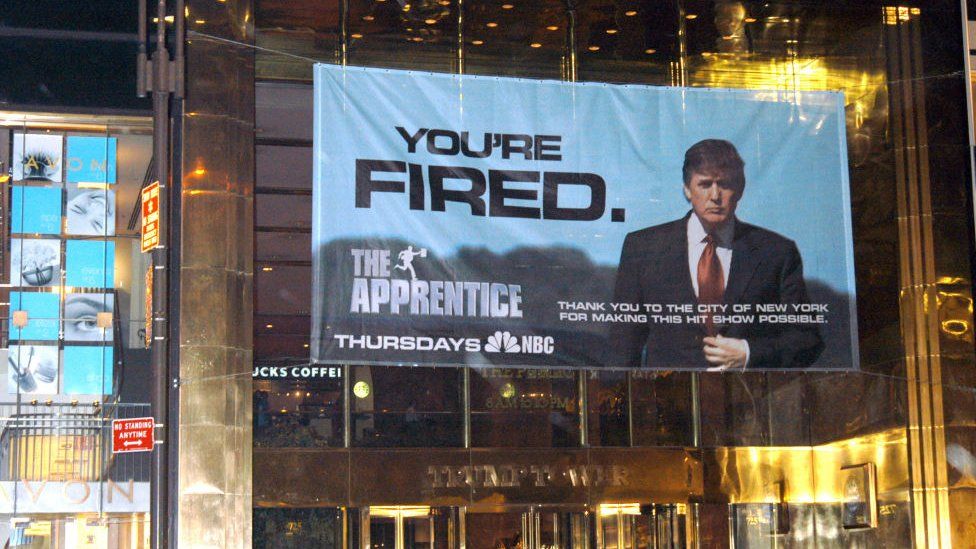For decades, he has marketed himself as a genius business mogul who made it big in one of the world's most cut-throat cities.
That image - forever tied to New York deal-making and reinforced by relentless self-promotion - catapulted him to international fame, allowing him to reinvent himself first as a reality TV star and then ultimately president of the United States.
But Judge Arthur Engoron's ruling in a civil fraud case - related to the inflation of property values and lying on financial statements to obtain better loan terms - undermines Mr Trump's entire narrative. It instead paints him as a fraud and inflicts a massive blow to his business empire and wealth.
Donald Trump once remarked that the mind can overcome any obstacle. But what an obstacle this is.
The verdict significantly curtails the Trump Organization's ability to do business in New York. He has personally been banned from holding any directorships for three years and his company cannot secure loans with financial institutions registered with the city during that time either.
He has been hit with an enormous financial penalty of $355m (£282m; €329m) - which jumps to more than $450m once interest is included - that far exceeds how much cash he has to hand. His business will continue to be be watched by an independent monitor, with a separate independent director of compliance also signing off on major business decisions.
In perhaps the only bright spot for the former president and Republican frontrunner, the Trump empire was spared from the equivalent of the corporate death penalty - the cancellation of its business licences.
Unsurprisingly, Mr Trump sees things very differently. He says he built a "perfect company" and rejects that he should be punished for fraud because banks were paid back in full. He continues to repeat claims, without evidence, that his legal challenges are just a plot by elite Democrats to keep him out of the White House.
According to Mr Trump's estranged niece Mary Trump, the judge's ruling amounts to the end of the Trump family legacy. "Today is an emotional day, but one thing is for certain: the Engoron decision is absolutely devastating for Donald," she wrote on social media.
As the son of a real estate developer whose projects included middle-class apartment buildings in the outer boroughs of Brooklyn, Queens and Staten Island, Mr Trump always dreamed of making a name for himself among the skyscrapers of Manhattan.
A seven-year spree of construction from 1976-1983, including the eponymous Trump Tower, solidified his reputation as a real estate giant in New York. ''Not many sons have been able to escape their fathers," he told the New York Times in 1983 - the implication being that at 37, he already had.
And it's true that the 1980s era of greed and excess was a prosperous time for a young developer with his ambition.
It is not yet clear how Mr Trump will pay the nearly half a billion dollars that he is liable for and if that will involve selling any assets or businesses to raise the cash. His sprawling real estate empire in New York is valued by Forbes at $490m but there are many other properties around the country, including hotels, golf courses, condominiums and even a winery.
He will appeal against the penalty, which would put the decision on hold until a higher court reviews the case.
But if he wants to avoid paying the fine or having his personal assets seized while the appeal process plays out, he still has to deposit the full amount within 30 days or secure a costly bond.
Selling any of his prime Manhattan real estate would be an indignity for the former president - and a decision he would not take lightly.
Whether or not Donald Trump is able to recover from this financial shock, the outcome looks sure to significantly dent his fortune.
The ruling in the city where he rose to the top - while always remaining something of an outsider - is undoubtedly a big loss. And for more than six decades in New York real estate, there's no figure Mr Trump has derided more than the "loser".
Trump Tower, with its prime location on 5th Avenue, put Donald Trump on the map. Once his reputation was established, he subsequently put his name on every project he did.
By the early 1990's though, Donald Trump filed for several corporate bankruptcies and nearly lost it all.
It was during this time that Rich Herschlag, the chief engineer in the Manhattan Borough President's office, worked with Mr Trump and his organization on the Riverside South project, a redevelopment in a former rail yard on the Upper West Side.
He says it meant "everything or darn close to everything" for Donald Trump to be seen as a successful real estate developer - and in particular build an empire from his father's legacy.
Mr Trump has for decades seemed to rally and recover from scandals and legal challenges that could irreparably damage others, so much so that he has been referred to as Teflon Don, because nothing sticks.
The nickname previously belonged to the mob boss John Gotti after he won a series of high-profile acquittals in the 1980s. But today's verdict signals that Donald Trump's luck, like Gotti's, may be running out.
Judge Engoron noted Mr Trump and the other defendants' lack of remorse and history of repeated and persistent fraud. In this case, he said the examples of fraud over more than a decade at the company "leap off the page and shock the conscience".
Yet the defendants were incapable of admitting the error of their ways, he said, writing: "Their complete lack of contrition and remorse borders on pathological."
